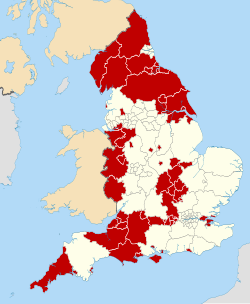Luton Borough Council | |
|---|---|
 Council logo [1] | |
| Type | |
| Type | |
| Leadership | |
Chief Executive (interim) | Mark Fowler since 4 April 2025 [3] |
| Structure | |
| Seats | 48 councillors [4] |
Political groups |
|
Length of term | 4 years |
| Elections | |
Last election | 4 May 2023 |
Next election | 6 May 2027 |
| Meeting place | |
 | |
| Town Hall, George Street, Luton, LU1 2BQ | |
| Website | |
| www | |
Luton Borough Council, also known as Luton Council, is the local authority of Luton, in the ceremonial county of Bedfordshire, England. Luton has had an elected local authority since 1850, which has been reformed several times. Since 1997 the council has been a unitary authority, being a district council which also performs the functions of a county council.
Contents
- History
- Governance
- Political control
- Leadership
- Composition
- Elections
- Wards
- Premises
- NHS
- Arms
- See also
- References
- External links
The council has been under Labour majority control since 2007. It is based at Luton Town Hall.
